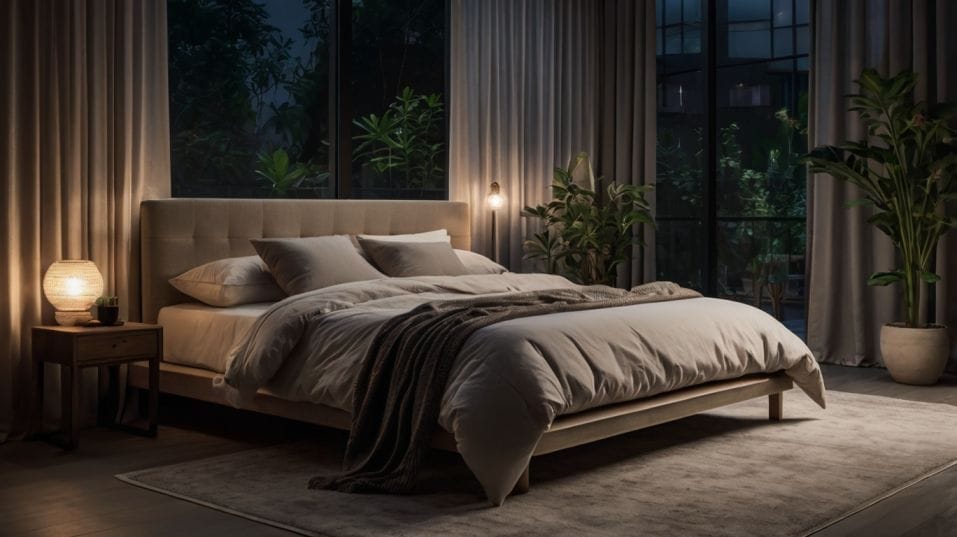Why Sleep May Be the Most Overlooked Pillar of Health
Discover how optimizing your sleep unlocks better energy, faster recovery, and mental clarity—without overhauling your lifestyle.

What if the key to unlocking better energy, sharper focus, and faster recovery was something you’re already doing—just not well enough? Sleep isn’t a luxury. It’s your body’s built-in upgrade system.
Dial it in, and everything you care about—fitness gains, clean nutrition, mental clarity—levels up without more effort.
The best part? It doesn’t take hacks or a total lifestyle overhaul. Just smart tweaks backed by science. Let’s break down how.
The Foundation You’ve Been Skipping
Sleep is the base layer of every healthy habit you’re building. When it's solid, everything else sticks. Nutrition choices get easier.
Training feels more effective. Mental clarity sharpens. It’s not just about avoiding fatigue—it's about unlocking your body's natural ability to repair, rebuild, and grow.
We live in a culture that worships productivity and celebrates the grind. Sleep gets treated like a weakness. Like it’s optional.
But if you’re chasing better energy, better recovery, better focus—sleep is the fastest, most sustainable upgrade you can make.
Every major system in your body depends on it. Your muscles rebuild during deep sleep. Your brain clears out toxins and organizes memories during REM sleep.
Hormones regulate. Appetite stabilizes. Mood evens out. And most of that happens while you’re unconscious, if you’re giving your body the time and conditions it needs.

Why “Enough Sleep” Is a Moving Target
You’ve heard the standard advice—get seven to nine hours. That’s not wrong, but it’s not the whole picture either. What really matters is sleep quality and rhythm.
Two people can both get eight hours. One wakes up refreshed and focused. The other wakes up groggy and fogged out.
Why? Because quality sleep depends on when you sleep, how deeply you cycle through each phase, and how much you disrupt your body’s natural rhythm.
Your circadian rhythm is the internal 24-hour clock that governs everything from hormone release to body temperature. It thrives on consistency.
You can’t game it by sleeping in on weekends or crashing early once a week. You lock it in by going to bed and waking up at roughly the same time—every day.
That rhythm also impacts how deeply you sleep. The first half of the night is loaded with deep, restorative sleep. That’s when your body hits the physical repair phase.
Miss that window—by staying up late, watching one more episode, or grinding through emails—and you’re stealing from your own recovery.
The Sleep Saboteurs Hiding in Plain Sight
You don’t need to have full-blown insomnia to be undermining your sleep. You just need a few bad habits stacked together. The biggest culprits? Screens, caffeine, light, stress, and late meals.
Screens
Start with screens. The blue light from phones, TVs, and laptops delays melatonin production. That’s the hormone your body needs to power down and enter sleep mode.
Even if you feel tired, that screen time pushes your internal clock later without you realizing it. The fix is simple: power down screens at least 30–60 minutes before bed. Not easy at first, but your body adapts fast once you give it the signal.
Caffeine
Then there’s caffeine. It doesn’t just keep you awake—it messes with sleep depth. Caffeine has a half-life of 5–6 hours, which means that late-afternoon cup lingers into the night.
Even if you fall asleep, you might not reach the deep sleep stages you need to feel truly rested. You don’t need to give it up, just time it better. Cut caffeine by early afternoon, and you’ll likely notice the difference within days.
Late-Night Eating
Late-night eating is another sneaky one. When you eat too close to bedtime, your body stays focused on digestion instead of repair.
Sleep becomes shallow. Hormonal rhythms get disrupted. Keep your last meal at least two hours before bed, and go lighter if it’s late.
Upgrade Your Environment, Not Just Your Routine
You can’t meditate your way to good sleep if your bedroom feels like a neon-lit sauna. Your sleep environment matters.
Your body is constantly scanning for safety and calm. If your room is too bright, too hot, or too loud, your brain stays on alert—even while you sleep.
Darkness
Darkness tells your brain it's nighttime. Blackout curtains, eye masks, and no glowing lights from chargers or screens can make a big impact.
Cool Air
Cool air supports deeper sleep. Aim for 60–67°F. Your core temperature naturally drops at night. Help it along.
Quiet
Quiet equals calm. If you live in a noisy area, try white noise, a fan, or earplugs.
This isn’t about spending a fortune on tech or chasing the perfect setup. It’s about removing friction. When your environment isn’t working against you, your body can do what it’s built to do—reboot, recover, and regenerate.
How to Build a Sleep Routine That Actually Works
You don’t need a military-grade routine or an app to sleep well. You need rhythm, repetition, and cues that tell your body it’s time to shut down.
One of the most powerful but underrated habits? Getting natural sunlight within the first hour of waking.
Morning light anchors your circadian rhythm. It tells your brain, this is day, which helps your body know when night should begin.
That simple shift makes it easier to fall asleep at the right time, without relying on supplements or screens to force it.
Another tip that works: start a wind-down cue. That can be a warm shower, light reading (paper, not screens), stretching, or calming music.
It’s not about perfection. It’s about repetition. The more your brain connects those cues with sleep, the faster it powers down when you need it to.
And yes—sometimes life gets in the way. You’ll have late nights. Travel. Stress. But when you’ve built a strong rhythm, you bounce back faster. Your body knows what to do.
Final Thoughts
Sleep isn’t just a pillar of health—it’s the one that holds the rest up. When you start respecting it, everything changes.
Workouts feel stronger. Focus gets sharper. Moods stabilize. Recovery accelerates. You get more from everything else you’re already doing.
And the best part? It doesn’t require a total lifestyle overhaul. You can start small. Cut caffeine earlier. Dim lights at night. Get sunlight in the morning. Protect your wind-down time. Stack a few wins, and your body will meet you halfway.
Start tonight. Create a cue. Power down earlier. Let your body do what it’s been trying to do all along—get better, every single night.
Want help designing a smart, science-backed sleep routine that fits your life? You’re in the right place.




